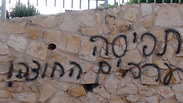
Israeli society will pay the price for 'price tag'
Op-ed: When Jewish extremists torch mosques and spray graffiti like 'Arabs out,' we must remember the lessons of the Holocaust.
Nonetheless, those among us involved in instilling the memory of the Holocaust understand that the historic experience places an actual duty on us which goes beyond commemorating the memory of the victims and the horrifying events which have long gone.
In the Ghetto Fighters’ House, for example, the study of the Holocaust takes place all year long as a relevant event, as an experience offering lessons and conclusions, as an event which can and should expose the dangers hidden in every current expression of racism and hatred.
One of the dangers lying in wait these days is the rise in the criminal acts referred to as "price tag." When Jewish extremists destroy Arab property, torch mosques and spray malicious graffiti like "Arabs out," we must remind ourselves of what was done to the Jews in Germany in the 1930s. We must remember the glass smashed in Jewish businesses, the synagogues set on fire and the spreading of the anti-Semitic slogan "Jews out."
We must remember the events of the past not because they resemble the violent incidents in our region in their dimensions or nature, but because our experience as a persecuted minority cannot accept serious hate crimes emerging from within us.
The Jewish perpetrators have adopted a racist tactic of the most visible and blatant kind, which is based on false accusations and the indiscriminate collective targeting of a minority group for no fault of its own.
The acts the Arabs are supposed to be paying that "price" for are unclear. It is clear, however, that the radical acts have reached a dangerous slippery slope. At first they were directed at the Palestinians in the territories, then they moved on to Israel's Arabs, and recently they have reached IDF soldiers trying to curb the acts of violence.
It's hard to understand how the Jewish-Israeli society, which has the events of the Holocaust engraved so deep into its collective consciousness, addresses these serious hate crimes against the minority living among it with such indifference. How is it possible that our experience taught us to be shocked at every attempt to set fire to a synagogue, but left us indifferent to the torching of mosques on our land?
This appears to be another area in which we have failed to draw the proper and required conclusions from the historic heritage. The State of Israel must adopt a tough policy against the criminal acts of violence, arrest and prosecute the people involved in these acts, and provide protection for the Arab minority living within the State and exposed to growing violence.
If there is an important lesson we must learn from the Holocaust, it is that we can’t be indifferent to hate crimes of any kind, and that such crimes are disastrous not only for their victims, but for all of us as a society. History teaches us that the hatred of few can turn into a dominating and dangerous ideology, that hooligans' racist behavior spreads like cancer if it is not treated properly.
If we fail to quickly adopt these lessons and fight the despicable and growing "price tag" phenomenon, the price will eventually be paid by all of us.
Former Minister Ophir Pines-Paz is the chair of the governing council of the Ghetto Fighters’ House.










